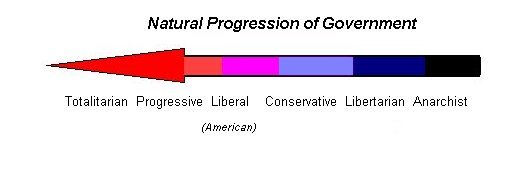Libertarian vs. Progressive, Rule of Law, and The Slippery Slope
by Jeff Van Wickler
 When you and I talk about politics we’re talking about the small stuff. Whether we should build a new county firehouse, or lower taxes on business to keep companies within our state, or on a national scale, whether we should pull out of NAFTA.
When you and I talk about politics we’re talking about the small stuff. Whether we should build a new county firehouse, or lower taxes on business to keep companies within our state, or on a national scale, whether we should pull out of NAFTA.
The ideologues on both sides of the spectrum though see politics on a much grander scale.
Libertarian vs. Progressive- The Libertarian distrusts government and wants only so much of it as is necessary. On a political scale; one step short of anarchy.
The Progressive believes only government can guarantee equality and wants government large enough to ensure that there is little economic (and political) distinction between individuals. On a political scale; one step short of totalitarianism.
The political philosopher would say the difference between the two schools of thought centers around the word equality.
The Libertarian wants equal opportunity and a rule of law applied equally to all- that no one citizen is granted favor over another. The Libertarian understands that people have different skills and motivations and that, in life, some will struggle, some will live comfortably, and some will achieve great prosperity.
The Progressive seeks de facto equality and wants government to ensure, no matter what the skills and motivation of the individual, that all citizenry will have (within reason) the same stature in life or, what I would call, the same amount of stuff.
The Rule of Law- In order for a society to function adequately, the rule of law can not be arbitrarily applied. There is an inevitable break down in society if laws are applied to one person and not another or if the law is changed with such frequency that citizens can not make rational economic decisions.
In a Libertarian society the rule of law is constant and applied equally. Individuals make rational decisions based on consistent law and as a result of being different from one another, achieve different levels of success.
In the Progressive society, however, different levels of success represents a failure by government. So, to avert failure, the law must apply differently to some individuals to achieve the equality of stuff that otherwise would not naturally occur.
An Example- A rule of law applied equally: A twenty percent flat tax costs the person making $100,000 per year, eighteen thousand more dollars than the person making $10,000 (Tax: $20,000 vs. $2,000). Here, the wealthier person shoulders 90% more tax burden but the two pay the same rate.
However, this scenario leaves an income disparity (after taxes) of $72,000 which is a failure by the Progressive standard. So, how is the disparity removed?
In societies that accept capitalism it is accomplished by progressive taxation (redistribution) – “taking property from one person to whom it belongs and giving it to another to whom it does not” —Bastiat.
In a collectivist society there is no need for redistribution. There is only distribution- “from each according to his ability; to each according to his need” —Marx. The distribution, of course, has nothing to do with merit.
Ultimately, what does perfect Progressive redistribution bring?
When one compares capitalist and socialist nations the results are quite stark. Compare West Germany’s Mercedes with East Germany’s Trabant. South Korea’s auto and computer industries with North Korea’s Choco Pie. Or, look at any number of African and Asian nations after independence. Those embracing a free market flourish. Those which do not see their GDP tank. Whether measured by economic output, personal wealth, or political freedom, the ultimate end of progressivism is bleak. But give credit where it is due- it is fairly equal in bleakness.
The Slippery Slope (see chart below)- Here’s the thing: The nature of government (and bureaucracy) is to grow and accumulate power. This progression is always done in the name of a good cause, but it is always done. When government becomes fully grown it’s called totalitarianism (total government): the opposite end of the scale from anarchy (no government). So, on the political scale, natural growth of government is from right to left. This means that there is no chance of a Libertarian government accidentally collapsing into anarchy because government is always moving in the other direction. But it does mean, as Hayek argued, that there’s a good chance that any collectivist government (socialist, fascist, etc…) can turn totalitarian. Our constitution was an attempt to halt or, at least slow, the slide.
Where are we today?
Well, Progressives are still around and today they have a strong foothold. They operate with nicer names now. Where they used to be called the Weather Underground or the Symbionese Liberation Army, today they are known as The Center For American Progress, People for the American Way, or ACORN. They have toned down the public rhetoric and learned to work within the system but the goal is still the same.
If you’re just an average Joe trying to understand why there’s so much fuss about nationalizing 1/6th of the economy for health care or government taking over a couple of car companies, keep this in mind: This is just one more good cause and one more slide left on the slippery slope.








Contemporary progressives are to the Weather Underground and the Symbionese Liberation Army as contemporary conservatives are to Scott Roeder and Timothy McVeigh.
And Tea Party conservatives are to Edmund Burke as the Reign of Terror is to the American Revolution.